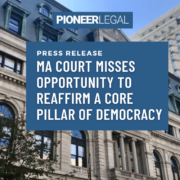MA Court Misses Opportunity To Reaffirm A Core Pillar Of Democracy
By not requiring that the Attorney General present an accurate, impartial summary of the tax hike amendment the MA SJC discounts the ideal of an informed voter
BOSTON – Today the Massachusetts Supreme Judicial Court missed an opportunity to reaffirm a basic tenet of American government: An informed electorate is necessary for a healthy democracy. The SJC’s decision will prevent Massachusetts voters from having an accurate description of the tax hike amendment to the state Constitution when they cast their ballots in November.
PioneerLegal filed an amicus brief in support of the lawsuit challenging the Attorney General’s summary language and “yes”/”no” statements that describe the amendment.
The proposed amendment to the state Constitution would add a 4 percent surtax on all annual income over $1 million, including capital gains (sales of homes and other assets) and most small business pass-through income. The proposed summary language put forward by the Attorney General and the Secretary of State reads that revenue from the tax would be dedicated to fund public education and transportation.
“While revenue from the tax would be deposited in transportation and education accounts,” said Frank J. Bailey, President of PioneerLegal, “there is nothing to prohibit lawmakers from diverting money previously dedicated to transportation and education to different purposes, as has occurred in other states.”
Speaking about the need for transparency in the constitutional amendment process, Bailey noted that: “a ballot initiative that seeks to amend the Massachusetts Constitution must be fairly described to voters. Absent an accurate summary of the effect of this vote, homeowners, small business owners, and retirees may well be surprised by the implications of a vote in favor of the amendment. Voters should never be surprised.”
Among the key points in the PioneerLegal brief authored by Daniel P. Ryan, Caroline A. Kupiec, and Jillian Friedmann of Sullivan & Worcester, are:
- The Attorney General’s own brief on an identical proposal in 2018 conceded that surtax revenues are fungible and may not result in any increase in appropriations for education and transportation. In the argument of the case before the Supreme Judicial Court, the Attorney General’s counsel also conceded this point and Chief Justice Gants made the same point.
- The Legislature made their intentions crystal clear by rejecting two amendments (by votes of 154-39 and 156-40) requiring new revenues to be invested in addition to existing expenditures.
- Finally, the brief provides a close analysis of the experience in California, where revenues derived from a similarly “dedicated education” tax largely substituted existing appropriations, which were then diverted to other purposes.


